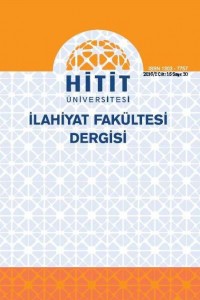Abstract
It is an important issue to choose one of the narrations when there are differences between them as much as determining the authentic hadiths. Hadith scholars had made this preference among the narrations due to the most confidential hadith and al-fuqaha had made this preference due to the preferrable narration. They had discussed this issue under the title of “Determining The Practicable Narration”. This issue is so important for explaining the occurence of definite schools. From this aspect, the narrations about tashahhud and the preferences of them are noteworthy. The narrations that came from the companions of Muhammad (pbuh) had been preferred with dif- ferent reasons by the founders of four main Islamic schools of law. It has seen that these reasons had been evaluated in different ways and acquired a different character. The criteria that al-fuqaha had taken into consideration while determining the preferred narrations and the evaluation of them will be discussed in terms of narrations about tashahhud from the aspect of determining more authentic narration.
Keywords
References
- Atar, Fahrettin, “Teşehhüd”, Türkiye Diyanet Vakfı İslâm Ansiklopedisi, c. 40, ss. 563-564.
Abstract
Hüküm ifade eden rivâyetler başta olmak üzere sahih hadislerin tesbiti kadar, nakiller arasında farklılık söz konusu olduğunda hangisinin tercih edileceği de önemli bir meseledir. Muhaddislerin en sahih hadis-isnad/esahhu’l-esânîd diyerek tercihte bulunduğu, fakihlerin de râcih gördüğü ve mamûlün bih olan rivâyetin tesbiti başlığı altında ele alınabilecek olan bu konu, erken dönemden itibaren belli başlı ilmî ekollerin ortaya çıkışının izahı açısından önemlidir. Bu yönüyle teşehhüd konusundaki rivâyetler ve bunların tercihi de dikkat çekicidir. Konu ile ilgili Hz. Peygamber’in ashabından gelen üç temel rivâyet, meşhur dört sünnî mezhebin imamı tarafından muhtelif gerekçelerle tercih edilmiştir. Bu gerekçelerin dönemler ilerledikçe farklı şekillerde değerlendirildiği ve çeşitlendiği görülmektedir. Bu makalede fakihlerin râcih olan rivâyetleri belirlerken göz önünde tuttuğu esaslar ve bunların değerlendirilmesi, en sahih rivâyetin tesbiti yönüyle teşehhüd rivâyetleri üzerinden ele alınacaktır.
References
- Atar, Fahrettin, “Teşehhüd”, Türkiye Diyanet Vakfı İslâm Ansiklopedisi, c. 40, ss. 563-564.
Details
| Primary Language | Turkish |
|---|---|
| Journal Section | Articles |
| Authors | |
| Publication Date | December 30, 2016 |
| Published in Issue | Year 2016 Volume: 15 Issue: 30 |


